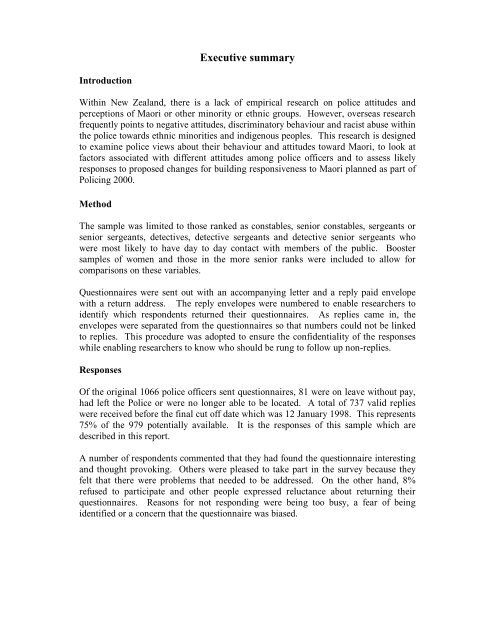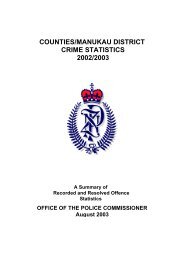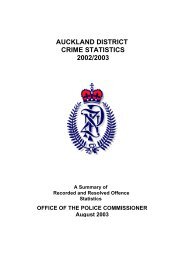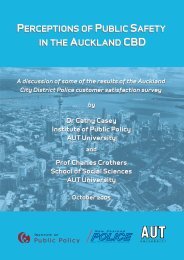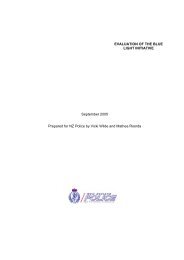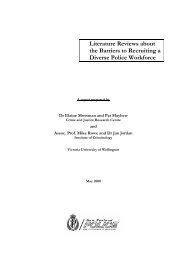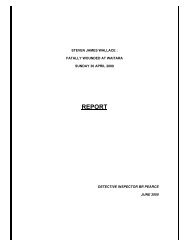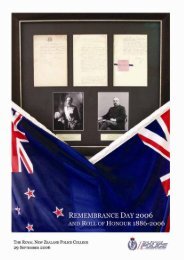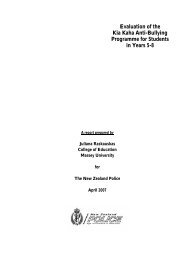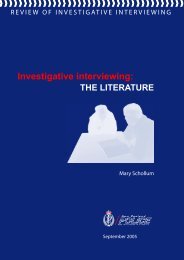Police Perceptions of Maori - Rethinking Crime and Punishment
Police Perceptions of Maori - Rethinking Crime and Punishment
Police Perceptions of Maori - Rethinking Crime and Punishment
You also want an ePaper? Increase the reach of your titles
YUMPU automatically turns print PDFs into web optimized ePapers that Google loves.
Executive summary<br />
Introduction<br />
Within New Zeal<strong>and</strong>, there is a lack <strong>of</strong> empirical research on police attitudes <strong>and</strong><br />
perceptions <strong>of</strong> <strong>Maori</strong> or other minority or ethnic groups. However, overseas research<br />
frequently points to negative attitudes, discriminatory behaviour <strong>and</strong> racist abuse within<br />
the police towards ethnic minorities <strong>and</strong> indigenous peoples. This research is designed<br />
to examine police views about their behaviour <strong>and</strong> attitudes toward <strong>Maori</strong>, to look at<br />
factors associated with different attitudes among police <strong>of</strong>ficers <strong>and</strong> to assess likely<br />
responses to proposed changes for building responsiveness to <strong>Maori</strong> planned as part <strong>of</strong><br />
Policing 2000.<br />
Method<br />
The sample was limited to those ranked as constables, senior constables, sergeants or<br />
senior sergeants, detectives, detective sergeants <strong>and</strong> detective senior sergeants who<br />
were most likely to have day to day contact with members <strong>of</strong> the public. Booster<br />
samples <strong>of</strong> women <strong>and</strong> those in the more senior ranks were included to allow for<br />
comparisons on these variables.<br />
Questionnaires were sent out with an accompanying letter <strong>and</strong> a reply paid envelope<br />
with a return address. The reply envelopes were numbered to enable researchers to<br />
identify which respondents returned their questionnaires. As replies came in, the<br />
envelopes were separated from the questionnaires so that numbers could not be linked<br />
to replies. This procedure was adopted to ensure the confidentiality <strong>of</strong> the responses<br />
while enabling researchers to know who should be rung to follow up non-replies.<br />
Responses<br />
Of the original 1066 police <strong>of</strong>ficers sent questionnaires, 81 were on leave without pay,<br />
had left the <strong>Police</strong> or were no longer able to be located. A total <strong>of</strong> 737 valid replies<br />
were received before the final cut <strong>of</strong>f date which was 12 January 1998. This represents<br />
75% <strong>of</strong> the 979 potentially available. It is the responses <strong>of</strong> this sample which are<br />
described in this report.<br />
A number <strong>of</strong> respondents commented that they had found the questionnaire interesting<br />
<strong>and</strong> thought provoking. Others were pleased to take part in the survey because they<br />
felt that there were problems that needed to be addressed. On the other h<strong>and</strong>, 8%<br />
refused to participate <strong>and</strong> other people expressed reluctance about returning their<br />
questionnaires. Reasons for not responding were being too busy, a fear <strong>of</strong> being<br />
identified or a concern that the questionnaire was biased.<br />
v


